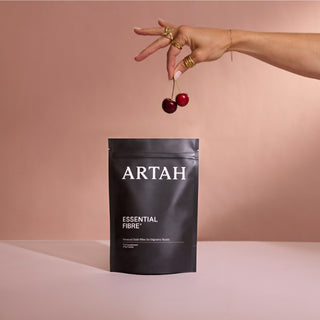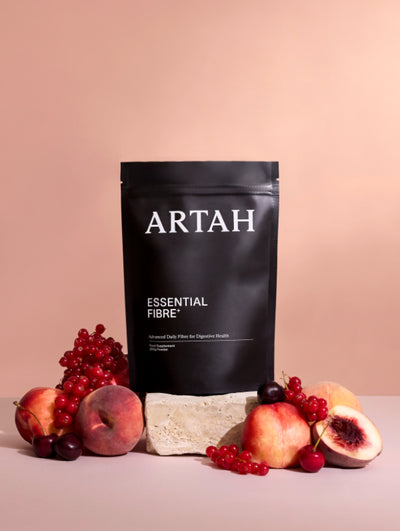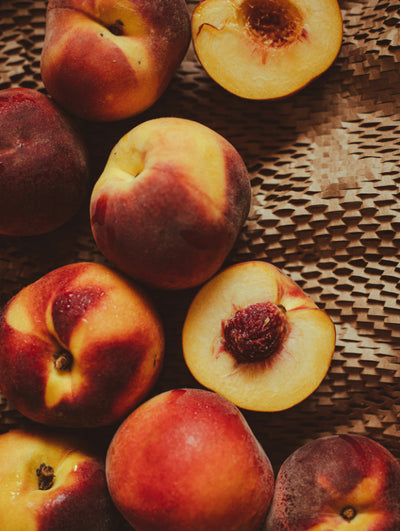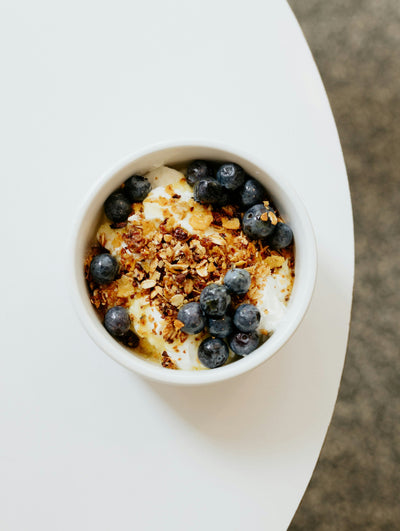6 Ways to Lose Belly Fat Without Cutting Calories
January is a natural time for a renewed focus on health, but it’s also a time when toxic diet culture can run amuck. Even though it's important to cultivate a consistent approach to health and wellbeing, it’s still a time when many people want to take control of their health and shed excess belly fat, which we know can increase our risk of various chronic illnesses. So what are some simple ways to work on body composition without going to the extreme? Here are 6 things you can do without cutting calories.Focus on Sleep or Non-Sleep Deep Rest
Easier said than done, but sleep has an enormous impact on body composition. Insufficient sleep can increase visceral body fat, reduce insulin sensitivity, and impair metabolic health, (1) making it one of the first things to address if you’re looking to make a change to your health. Parents rejoice – even if you can’t inrease the hours you sleep at night, non-sleep-deep-rest (NSDR) is a tool you can use to elicit some of the metabolic and emotional benefits of sleep. (2) So what is it, and how do you do it? The most common form of NSDR is Yoga Nidra, which is a type of guided yoga meditation that gets the body into a restful state, but essentially, any time of guided meditation will work. Self-hypnosis can also do the trick– our favourite app is Reveri, created by Dr David Spiegal, Associate Chair of Psychiatry at Stanford School of Medicine, which has tons of research behind it. The best news? These sessions can be as little as 10 minutes, making it a very achievable tool for busy people.
Reduce Oxidative Stress
The processes that are happening in our body at any given moment produce unstable chemical compounds called free radicals. These molecules are made as natural biproducts of things like breathing, digestion, metabolism, and energy production, but there are also external factors that increase our free radical load, like environmental pollutants, alcohol, smoking, drugs (recreational and prescription), food chemicals and radiation. Luckily, we have several built-in defence mechanisms that are designed to neutralise these free radicals - like enzymes and antioxidants - before they cause damage. There is a delicate balance between free radicals and antioxidants that we need to maintain; when the level of free radicals exceeds our antioxidant capacity, they build up in our cells and can cause damage - referred to as oxidative stress - to important cellular components like DNA, proteins and cell membranes. This damage can eventually lead to cellular dysfunction, structural defects of our DNA, mitochondrial impairment, and also contribute to metabolic syndrome. (3) We naturally lose anti-oxidant capacity as we age, but there are other things we can do to help. How can you reduce oxidative stress?
- Things that contribute to oxidative stress include smoking, alcohol, too much sugar, ultra processed foods, deep fried foods, pesticides, chemical exposure, bisphenols, excessive intense exercise and infrequent intense exercise.
- Things that combat oxidative stress include polyphenol rich foods, rich coloured fruits and vegetables, regular exercise with adequate recovery, fibre, whole foods, cold pressed organic olive oil, stress management like mindfulness, and a broad-spectrum antioxidant support like Advanced Multi-Nutrient, which contains over 41 vitamins, minerals, botanicals and key anti-oxidant support like CoQ10, Alpha-Lipoic Acid, and Glutathione.
Build Muscle Mass
We lose muscle faster than you may expect; after the age of 30, muscle mass naturally drops by about 4-8% per decade until the age of 60, after which, the rate of decline is even faster. (4) Lack of muscle makes us vulnerable to injury, but it also has greater implications to overall wellbeing. The most influential is probably its impact on metabolic health and blood sugar regulation. Muscles are a source of non-insulin dependent glucose uptake; in simple terms – they act like a sponge for sugar and bypass the need for our bodies to produce and release insulin. Not only does this decrease our total insulin load (critical for long term health), but it gives us more control over our blood glucose and a greater carbohydrate tolerance. In addition, cultivating muscle mass is like a form of metabolic insurance; the healthier our muscle and more muscle we carry, the better our metabolic rate and efficiency, which in turn, can help our reduce visceral fat. If you’re looking to shed excess belly fat, working on muscle is a great place to start.
Take Break From Alcohol
A standard glass of wine comes in at around 120-165kcal, with pints reaching well over 200kcal. But the direct caloric impact is only one aspect of drinking; alcohol makes us tired, reduces self-control, and is a form of calories that isn’t satiating. Whilst cutting alcohol could technically be considered cutting calories, this is a powerful way to improve body composition without using food as a lever. January is the perfect time to reduce or avoid alcohol, and it will also benefit your sleep, stress, gut health and more.
Cut Ultra-Processed Foods
This one is kind of a cheat, because whilst you don’t need to cut calories to see a difference, you’ll probably end up cutting calories naturally as a side effect. Why? Because studies have shown that those with a high intake of UPF can eat up to 813kcal excess per day – (5). You read that right – that's a huge swing between what we naturally consume when we eat UPF. This is because these foods are notoriously harmful for our metabolism (think low fibre, high calories, low vitamins and minerals), and they also hijack our brain chemistry because of their flavour profiles, which are a distinct blend of salt, sugar and fat to make them as addictive and hedonic as possible. For example, 1kg of potatoes yields 250g crisps. The calorie count between these are drastically different, with plain potatoes at c. 536kcal vs the crips at c. 1330kcal. If you compare how easy it would be to sit down and eat 1kg of baked potatoes (with no salt, oil, or butter) vs how easy it is to eat 250g crisps, you can easily see how quickly things add up. Before you worry about cutting calories to the extreme, swap out as much UPF and added sugar as you can and replace it with whole, minimally processed foods. You’ll be amazed at the difference.
Try Chrono-Nutrition
We all know that what we eat has a profound impact on our health and wellbeing, but with the emerging science of Chrono-Nutrition, we now also know that it’s not just what we eat, but when. Chrono-nutrition is the study of how the composition and timing of our nutrition interacts with our biological clock – also known as our circadian rhythm. This rhythm governs more than our sleep wake cycle, it also influences metabolic efficiency, energy expenditure, gut motility, and even the composition of the microbiome. As a first and simple step, reduce late night eating. Studies have shown that individuals who eat later in the evening (c. 9pm) have higher blood sugar levels and worse blood sugar control than those who didn’t. (6) Our ability to process different types of nutrients at different times also varies throughout the day, so making simple swaps can make all of the difference. To learn more, join our new nutrition programme, The Chrono Reset starting January 13th. This 3-week programme will dive deep intro what to eat, when to eat, and has a Chrono-Fast in Week 2 to melt belly fat, alongside on-demand fitness and live support.
Disclaimer: The information presented in this article is for educational purposes only and is not intended to diagnose, prevent, or treat any medical or psychological conditions. The information is not intended as medical advice, nor should it replace the advice from a doctor or qualified healthcare professional. Please do not stop, adjust, or modify your dose of any prescribed medications without the direct supervision of your healthcare practitioner.
References:
1. Kawasaki Y, Kitamura E, Kasai T. Impact of Body Composition on Sleep and Its Relationship with Sleep Disorders: Current Insights. Nat Sci Sleep. 2023 May 17;15:375-388. doi: 10.2147/NSS.S340946. PMID: 37220427; PMCID: PMC10200107.
2. https://www.sleepfoundation.org/meditation-for-sleep/what-is-non-sleep-deep-rest
3. Manna P, Jain SK. Obesity, Oxidative Stress, Adipose Tissue Dysfunction, and the Associated Health Risks: Causes and Therapeutic Strategies. Metab Syndr Relat Disord. 2015 Dec;13(10):423-44. doi: 10.1089/met.2015.0095. PMID: 26569333; PMCID: PMC4808277.
4. Bradshaw, P.T. Body composition and cancer survival: a narrative review. Br J Cancer 130, 176–183 (2024). https://doi.org/10.1038/s41416-023-02470-0
5. Hamano S, Sawada M, Aihara M, et al. Ultra-processed foods cause weight gain and increased energy intake associated with reduced chewing frequency: A randomized, open-label, crossover study. Diabetes Obes Metab. 2024; 26(11): 5431-5443. doi:10.1111/dom.15922
6. Bermingham, K.M., May, A., Asnicar, F. et al. Snack quality and snack timing are associated with cardiometabolic blood markers: the ZOE PREDICT study. Eur J Nutr 63, 121–133 (2024). https://doi.org/10.1007/s00394-023-03241-6


















































